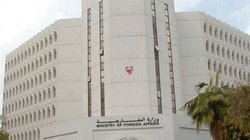 The United Nations expressed concern that a mass trial by a court in Bahrain that stripped nearly 140 people of their nationality this week had not met international fair trial standards.
The United Nations expressed concern that a mass trial by a court in Bahrain that stripped nearly 140 people of their nationality this week had not met international fair trial standards. RNA - The tiny island country’s High Criminal Court handed 139 Bahraini nationals prison terms of three years to life and revoked the citizenship of all but one of them, presstv reported.
The court gave life sentences to 69, while 39 others received 10 years in jail each. Many of the defendants were tried in absentia.
All the defendants were convicted of trumped-up terror-related charges, and found guilty of forming a “terror” cell called “Bahraini Hezbollah Brigades” allegedly linked to Iran’s Islamic Revolution Guards Corps (IRGC).
“There are serious concerns that the court proceedings failed to comply with international fair trial standards, with a large number of the accused reportedly tried in absentia,” Michelle Bachelet, the UN High Commissioner for Human Rights, said in a statement on Thursday.
She added that the revocation of nationality could have serious consequences in daily life, including the denial of the right to health, education and freedom of movement.
“Tuesday's convictions give rise to serious concerns about the application of the law, particularly through a mass trial that reportedly lacked the procedural safeguards necessary to ensure a fair trial,” Bachelet further stated.
The UN official announced that the deprivation of nationality “must not be arbitrary”, particularly on “discriminatory grounds” and that such a measure could place the affected people and their family members in a situation of “increased vulnerability to human rights violations”.
Bachelet also voiced the world body’s concern at reports of torture or other ill-treatment of some of those convicted, strongly calling on Bahraini authorities to take “immediate steps” to stop such violations.
This is the second such mass trial in Bahrain in weeks. In the last case in February 2019, 167 people were convicted, primarily for participation in a non-violent sit-in protest against the Al Khalifah regime.
Since 2011, when a popular uprising began against Al Khalifah, the kingdom which hosts the US Navy’s Fifth Fleet has prosecuted hundreds of protesters in mass trials and banned main opposition groups as a part of a heavy-handed crackdown aimed at stifling opposition voices.
Thousands of anti-regime protesters have held demonstrations in Bahrain on an almost daily basis ever since the popular uprising began. They are demanding that the Al Khalifah regime relinquish power and allow a just system representing all Bahrainis to be established. Scores of people have lost their lives and hundreds of others sustained injuries or got arrested as a result of the Al Khalifah regime’s crackdown.
847/940